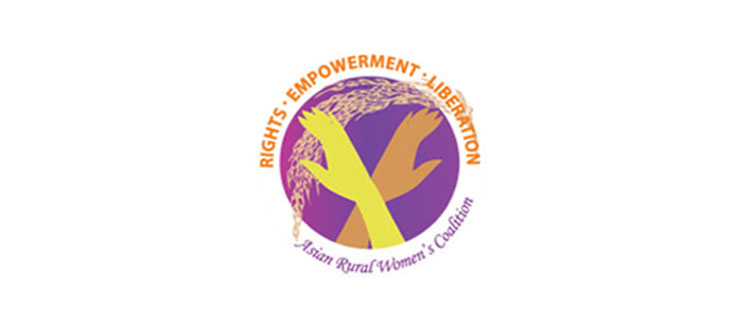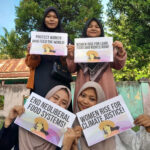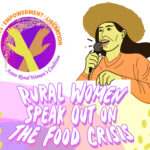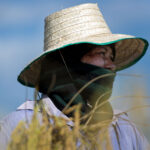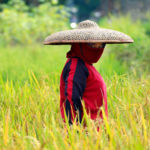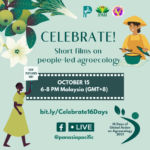Asian Rural Women’s Coalition Statement on the Rio+20 Summit: Sustainable development will only be achieved through gender, economic, and ecological justice, not the ‘green economy’
Today’s commemoration of International Women’s Day is an opportune time for rural women to celebrate victories, including palpable gains towards achieving sustainable development as defined by the collective struggle for rights, empowerment, and liberation. But with the intensifying world financial and economic crisis, monopoly capitalist forces are more determined than ever to squeeze super profits from the world’s natural resources and labour force, increasing efforts to ultimately derail or coopt the quest for genuine sustainable development.
Twenty years ago, the United Nations Conference on Sustainable Development in Rio, Brazil (also known as the Earth Summit) led to the forging of historic commitments from governments around the world to save the planet. This June, the Rio+20 Summit will be held to assess how much of the Earth Summit’s goals have been achieved, and to define measures that will chart the path towards sustainable development.
Women consist half of the largely rural population in Asia, which consists of 70% of the region’s poor and marginalised. For Asian rural women, the promises of the Earth Summit have not been fulfilled. In fact, the over-all situation has grown from bad to worse for the world’s small food producers. There is increased rural poverty because of the lack of genuine land reform, control of agrochemical transnational corporations over agriculture, and the lack of government support. There are more frequent and destructive ecological disasters, with rural people, and women in particular most affected by the impacts of climate change yet without the means to mitigate or cope with its effects. There is increased land grabbing and plunder of natural resources. Wars of aggression, militarisation, as well as forced labour migration have intensified. Women continue to suffer from reasons that are preventable for example during pregnancy and in childbirth. In short, there has been no genuine sustainable development but rather, more dispossessed, disempowered, and broken communities living on poisoned or fast-depleting natural resources.
Rural women bear the double brunt of suffering. They are denied sustainable livelihoods and made dependent on chemicals that harm their health and the environment in which they raise their families. They are denied stewardship and control over genetic resources. They are sexually abused and denied access to the services for their health specially for the sexual and reproductive health. They receive even less recognition for their contributions, and even more gender discrimination in social, economic and political spheres of life. Violence against women and children is more rampant in this position of dispossession and powerlessness.
Unfortunately, the Zero Draft of the Rio+20 Summit glosses over how capitalist-driven development has made sustainable development an even more remote reality, except perhaps in communities where people’s movements have strongly resisted. The Zero Draft hypes the “Green Economy” and falsely states that it serves sustainable development and poverty eradication. But the Green Economy is anchored on the continuation of existing policies of neo-liberal globalisation with capitalists desperately seeking new opportunities for profit. The Green Economy promotes the efficiency of managing natural resources for economic growth as it is defined by overproduction, and not by the planned economy of self-sustaining and sovereign communities and nations. It will strengthen the corporate intellectual property rights regime, commodifying natural resources in the guise of preventing its plunder. It will encourage more private-public partnerships which will intensify the privatisation of the world’s natural resources. The Green Economy is not committed to seriously reducing the world’s carbon emissions, but only allows companies to pay their way out of their excesses through carbon trading. It entices corporations to further invest in agriculture in the guise of “greening” it through new technology. But upon closer scrutiny, these new technologies and investments are actually geared towards opening up new markets through the increased privatisation and commodification of nature and the ecosystem. They will only serve to further consolidate corporate control over agriculture, and promote even more harmful technologies. Furthermore, in the guise of calling them “environmentally harmful,” the Green Economy is against so-called “market distortions” in order to justify continued support to inequalities in the world’s economic trading system represented by the World Trade Organization.
Another point of concern for rural women is that while the Zero Draft expresses a commitment to promote gender equality, it lacks concrete measures and targets to do so. It is essential to ensure the active and meaningful participation of women in all decision-making processes, especially in defining sustainable development and in upholding women’s rights with respect to human rights.
The Rio+20 Summit negotiations must take into account the voices of rural women, which make up half of the world’s majority population. The summit is a huge opportunity to push for gender-responsive policies and their implementation; various multi-level instruments that assure women’s rights, control and access to land and resources; strong health policies and programmes to ensure improved sexual and reproductive health and rights of marginalised women; and strong measures for the recognition and participation of women in all spheres of life. In charting the path towards sustainable development, due attention must be given to the protection and promotion of the health and well-being of women and their children; the rights and welfare of agricultural women workers; and protection against gender-based discrimination and violence.
It is doubtful that these aspirations will be achieved within the framework of the Green Economy. The Asian Rural Women’s Coalition is pushing for the alternative framework of food sovereignty and biodiversity-based ecological agriculture that is based on gender, economic, and ecological justice. In practice, this framework has made people-led sustainable development in many rural communities possible. The Asian Rural Women Coalition (ARWC) re-affirms that there can be no sustainable development without a radical rethinking of the concepts of growth, without serious criticism and reversal of the destructive policies of neo-liberal globalisation, and without the genuine participation of peoples’ and women’s movements. The Rio+20 Summit must take recognizance of this, if it is to pursue its mission to save the planet earth and its people. ARWC asserts rural women’s rights to development and sovereignty over land, life and biodiversity!
For Rights, Empowerment and Liberation!
Asian Rural Women’s Coalition
8 March 2012
THE ASIAN RURAL WOMEN’S COALITION (ARWC) IS COLLECTIVELY LED BY A STEERING COMMITTEE COMPOSED OF 13-MEMBER GROUPS OF NATIONAL WOMEN’S ALLIANCES AND REGIONAL WOMEN’S ORGANISATIONS IN ASIA REPRESENTING RURAL WOMEN AND ADVOCATES: Society for Rural Education and Development (SRED) and Tamil Nadu Women’s Forum (TNWF), India * Tenaganita, Malaysia * Human Development Organisation (HDO), Sri Lanka * INNABUYOG and GABRIELA National Alliance of Women’s Organisation, Philippines * All Nepal Women’s Alliance (ANWA), Nepal * Committee for Asian Women (CAW) *Asia Pacific Forum on Women, Law and Development (APWLD) *Asian-Pacific Resource and Research Centre for Women (ARROW) *Coordination of Action Research on AIDS and Mobility (CARAM ASIA) *International Movement Against All Forms of Discrimination and Racism IMADR) *Pesticide Action Network Asia and the Pacific (PAN AP)
For more information, contact: secretariat@asianruralwomen.net
www.asianruralwomen.net

